
It is wonderful to join you on Ngunnawal country. Thank you for your welcome, and to the traditional owners of this land. I am delighted to be celebrating the launch of the RHD Endgame Strategy – a world-leading project for researchers to walk with us and make the commitments to end rheumatic heart disease a reality.
Rheumatic heart disease begins with a sore throat or a skin sore. For our Aboriginal and Torres Strait Islander children, these are common infections. They spread quickly in overcrowded houses, due to hardware problems and insufficient access to medical care. Without appropriate treatment they can cause an abnormal immune reaction in the heart, causing damage to the heart valves. The effects of that last a lifetime. A lifetime which, too often, is cut short.
Today, I call for that cycle of infection, disease and tremendous sadness to end. We know what needs to be done, and we know that it can be done. Our shared vision is that no child born in Australia from this day forward dies of RHD. I am asking all of you now to help make that happen.
I want to tell you why this matters to me. As the CEO of NACCHO, I lead the Aboriginal and Torres Strait Islander primary care sector. Being comprehensive means that we do everything – immunisations and iron infusions, injuries and ischaemic heart disease. Doing everything means that we rarely choose to focus on a single disease. There is so much to be done, we can’t afford to have ‘favourite’ diseases.
But RHD sticks out. It’s the greatest cause of cardiovascular inequality for Aboriginal and Torres Strait Islander people in this country. Non-Indigenous people, literally, just don’t get it. 98% of people who get RHD are our people. We get it because of crowded houses, because – despite our best efforts – showers don’t work, taps don’t run, and clothes don’t get washed. We get it because our clinics are overwhelmed with demand and sometimes skin sores and sore throats go untreated. We get it because the diagnosis is missed and sometimes it is too late for treatment. All that needs to change.








